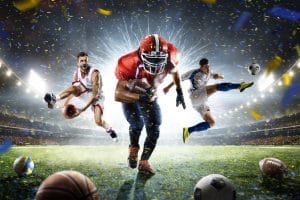Protecting a College Athlete’s Future Through a Registered NIL Trademark
Dramatic policy shifts within the NCAA now allow for college athletes to generate income from their name, image, and likeness (NIL) in the 2021-22 season and beyond. With these new opportunities come additional challenges for athletes trying to protect their brand and navigate the legal implications of NIL activities.
In this article, you will learn more about how the recent changes to NIL policies in college athletics transpired, and how you can protect your brand through trademark registration and other legal safeguards.

What Is an Athlete’s Name, Image, and Likeness?
NIL refers to all the identifying elements that embody you, along with their commercial value. This includes physical attributes and personality traits that lead to your public recognition. Many college athletes have a valuable NIL because of their unique set of talents and public visibility that comes from playing a sport at the NCAA level.
Businesses and other organizations recognize the value that student-athletes can provide to their bottom-line through marketing campaigns and other partnerships. Recent reports already show that high-profile college athletes are striking major endorsement deals. Athletes are also creating their own opportunities by establishing NIL trademarks and rolling out their own merchandise.
How a Court Decision and New NCAA Policy Created NIL Opportunity
Prior to this point, college athletes could not profit from their NIL because of NCAA policies that restricted the behavior — citing reasons like promoting amateurism and protecting fair competition. Within the last couple of years, some states (most notably, California’s Fair Pay to Play Act) enacted laws to prohibit universities from preventing its athletes to profit from their NIL.
Over the summer, the U.S. Supreme Court unanimously ruled in NCAA v. Alston that the NCAA could not limit the amount of education-benefits a university provides its student-athletes. Although the antitrust issue in Alston was not about NIL, the court’s opinion increased doubts over the NCAA’s ability to survive future challenges from its NIL policies.
The NCAA’s leadership promptly voted and approved an interim policy to allow college athletes to pursue NIL deals without violating the NCAA’s bylaws. In addition to allowing NIL opportunities, some of the details of the new interim NCAA policy include:
- Athletes can use professional services to procure NIL opportunities (e.g., trademark attorneys, agents, etc.).
- NIL opportunities are allowed, so long as they are consistent with applicable state law.
- Athletes should report NIL deals to their university as a best practice.
NIL Trademarks and Other Strategies for Protecting a Student Athlete’s Brand
The current NIL landscape is unprecedented. While that provides valuable opportunities for athletes, you should be aware of the business, political, and legal challenges of engaging in NIL activities. Arming yourself with knowledge of the legal implications of NIL can help you evaluate future offers and create a plan for maximizing NIL potential.
Register a Trademark for Brand Identification and Protection
A trademark is a combination words and/or symbols that allow consumers to identify and associate a brand with a particular product or service. While common law trademark rights exist, many choose to register their trademark with the United States Patent and Trademark Office (USPTO). Registering a trademark with the USPTO creates beneficial presumptions for your brand on a national scale in the event of infringement or other disputes.
For college athletes, having a registered NIL trademark can give you greater control and value in NIL endeavors. Instead of relying on marketing opportunities with other companies, you can begin to establish a brand and build a community with a trademark.
You can promote the trademark on social media outlets and generate interest for products and services like:
- Merchandise (shirts, hats, sweatshirts, etc.)
- Sports camps and other hosted events
- Speeches and appearances
- Fundraising and charity events
A well-established trademark is a valuable piece of intellectual property that can lead to solicitations from other companies for future licensing agreements and business opportunities beyond school. Registering a trademark with the USPTO requires extensive knowledge of the application process and trademark law. The process can also take several months before approval from a USPTO agent.
Assistance from a NIL trademark attorney can help with the necessary searches and review of a mark before expending the money on a filing fee.
Some Trademark Examples of Athletes’ Trademarks Already Filed
Graham Mertz – (Wisconsin QB) – GM Logo (Serial No. 90795860) 
Paige Bueckers – (University of Connecticut NCAAW Point Guard) – PAIGE BUCKETS (Serial No. 90826196)
Kenny Pickett – (University of Pittsburgh QB) – K8 Logo (Serial No. 90830154) 
Stay Informed on University Policy, State Law, and Contract Terms
Exploring NIL deals involves several moving parts and competing interests, such as your university’s policies, applicable state laws, and your contract terms with partner companies. Your school’s policies may prohibit certain NIL activities or endorsements in some industries. Disclosing NIL deals to your school before signing can help avoid conflicts between your university and marketing partners that result in ultimatums.
With large amounts of money at stake, most NIL opportunities will require formal written contracts outlining the rights and obligations of both parties. Common contracts in NIL deals might include:
- Endorsement contracts
- Licensing agreements
- Independent contractor agreements
- Contracts for the sale of goods
Take the time to read and understand the terms of a particular deal and how they align or conflict with your brand or future NIL opportunities. Hiring a NIL trademark lawyer or a sports agent can help you get sound advice on the risks of a NIL opportunity.
Other Legal Protections for NIL Athletes
Making money on your NIL is effectively running a business with you as the company’s greatest asset. However, no business opportunity is without risk, and college athletes should consider other systems that can provide liability protection.
For example, you may benefit from establishing an LLC or other business entity to create a layer of separation and protection between yourself and your NIL activities. Acquiring standard commercial insurance might also be wise in the event of expensive accidents or other unexpected conflicts (e.g., lawsuits, injuries, etc.).
Additional Help with NIL Trademark Registration for NCAA Athletes
The recent changes on NIL by the NCAA have led to an exciting time for college athletes to start generating income from their unique platforms. However, much uncertainty exists about future NCAA and university policies that might affect how athletes can approach NIL trademarks and opportunities.
As a college athlete, you can prepare yourself for future NIL deals by treating your brand like a business. Trademark registration, business entity formation, and skilled legal representation can help you build a solid foundation for maximizing the value and longevity of your NIL activities.